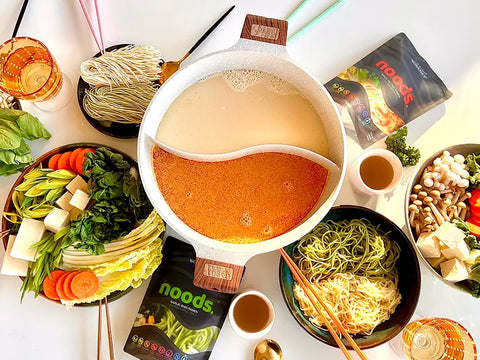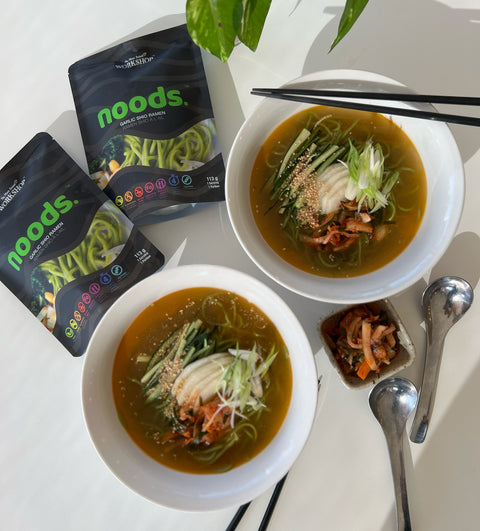Ramen remains one of the most consumed meals around the world by noodle lovers.
Perhaps you might have asked yourself, "How long does ramen last?"
This well-rounded guide with our expertise takes a closer look into the shelf life of different types of ramen noodles, the best storage methods, and ways to ensure your ramen will always be fresh for safe consumption.
Key Takeaways
- Learn the shelf life of instant, fresh, and dehydrated ramen noodles.
- Become familiarized with how ramen should be stored for optimal quality over time.
- Learn how to determine if ramen noodles and broth have gone bad.
How Long Does Instant Ramen Last?
Instant ramen noodles are made from a basic mixture of flour, water, salt, and kansui—a type of alkaline mineral water. After the dough is formed and shaped into noodles, it undergoes a crucial dehydration process.
This step is typically achieved by either deep frying the noodles or blow drying them, which effectively removes almost all of the moisture content. By eliminating moisture, the noodles become much less hospitable to bacteria, mold, and other microbes that would otherwise cause spoilage.

As a result, the noodles can be safely stored for extended periods, often up to two years, without the need for refrigeration or preservatives. This dehydration process is the key factor that allows instant ramen to last so long.
An unopened instant ramen can last up to 2 years. The key to such a long life is mainly due to its airtight packaging and the preservatives used in manufacturing the noodles.
These are the key factors that make it difficult for moisture to seep in and cause the noodles to spoil. On the other hand, one of the reasons that instant ramens are unhealthy choice to consume because of its preservatives.
However, once the package is opened, the exposure to air and moisture would render the noodles stale, reducing the shelf life to just a few weeks.
If you want to maximize the shelf life when you open an instant ramen package, place it in an airtight container and keep it inside the fridge. This could help retain its freshness for up to one week.
Spoilage of instant ramen is mainly determined by food safety. If it develops an off smell, a change in texture, or mold, then discard it.
Best Practices for Storing Instant Ramen
Properly storing instant ramen will ensure its quality. Unopened packages should be stored in a cool, dry place, such as a pantry or cabinet.
An ideal environment would help preserve the flavours and texture of the noodles by preventing moisture from penetrating.
If you need longer shelf life for instant ramen, then freezing is a good option. Just store the noodles in a freezer bag or container, label it with the date, and put it in the freezer. Frozen instant ramen will last for a month.
When you are ready to consume, thaw the noodles in the refrigerator overnight before cooking.
How Long Do Fresh Ramen Noodles Last?
Fresh ramen noodles are much more renowned for their superior taste and texture, yet they have a far shorter life compared to the instant version of ramen.
Since fresh ramen noodles undergo no preservative treatment during their processing, they must be treated with care in terms of handling and storage.
They can be stored in the refrigerator for up to a maximum period of two weeks but should be kept in an airtight container to maintain freshness.
Freezing is an effective means of preserving fresh ramen. Fresh ramen can last for two months in the freezer, provided that it is kept in a freezer-safe bag or container.
Just bear in mind that freezing may slightly affect the texture of noodles and make them less chewy than usual.
It's always good to first inspect the fresh ramen for any spoilage before consumption.
A sour smell, slimy texture, or any form of discolouration may mean that the noodles have gone bad.
Why Fresh Ramen Noodles Have a Shorter Shelf Life?
Fresh ramen noodles have a shorter life because of the ingredients used and the lack of preservatives.
Fresh noodles usually contain eggs as common ingredients, along with other perishable components prone to spoilage.
These ingredients, coupled with high moisture content, provide a conducive environment for bacteria and mold to proliferate rapidly.
In contrast, instant ramen noodles are processed to dehydrate the moisture within them to extend their shelf life.
Fresh ramen, however, lacks this dehydration process, requiring them to be kept either in the fridge or freezer.
The important thing to know about extending the shelf life of fresh ramen is that it should be stored in the fridge or freezer immediately after purchase.
Even in the most carefully stored environment, fresh ramen noodles will not last as long as their instant counterparts, so it is best consumed within the recommended timeframe.

How Long Do Dehydrated Ramen Noodles Last?
Our dehydrated vegan ramen noodles are manufactured to have an extremely long shelf life.
These noodles are prepared by removing almost all moisture content to have the ramen last longer.
This is one of the main benefits of dehydrated ramen noodles that our nood lovers talk about.
When stored in a cool, dry place, dehydrated ramen noodles could last up to 24 months or even longer.
Our dehydrated noodles are an excellent option for long-term storage or emergency food supplies, and even for those who simply like to stock up, due to the long shelf life of dehydrated noodles.
The amazing part is that we never user preservatives to keep our noods shelf stable. The unique dehydration method also helps to keep all nutritions while having long shelf-stable noodles to slurp.
Since they are stable in nature, they can be kept in the pantry and do not require refrigeration or freezing, making them a convenient option for any kitchen.
Like any product with a long shelf life, dehydrated noodles that have been opened must be stored in an airtight container to prevent them from coming into contact with moisture.
This type of noodle is far less likely to go bad compared to fresh ramen noodles, but they can indeed deteriorate if not stored properly.

How Long Does Ramen Broth Last?
Whether store-bought or homemade, ramen broth has different storage considerations.
Ramen broth will generally last for four to five days in the fridge.
The best way to keep it fresh is by storing it in an airtight container to prevent it from taking on other flavours and odours in the fridge.
Freezing is an excellent choice if you will not be using the ramen broth anytime soon.
When ramen broth is kept under good conditions in a freezer-safe container, it can last for about six months.
By freezing small portions of broth, you only need to thaw the amount you might need at that particular time, reducing waste and keeping the broth fresh.
Best Practices for Storing Ramen Broth
Our ramen broth pouches should be stored in airtight containers for effectiveness.
Since our broth pouches are air-tight, they are also shelf-stable to consume them in a long time period.
This prevents the broth from absorbing unwanted odours and flavours from other foods in the fridge or freezer. If you plan to use the broth within a week, keeping it in the fridge is sufficient.
Longer storage is best done by freezing.
Freeze the broth in small portions in freezer-safe containers or bags.
This method makes it easier to thaw just the needed amount, and helps preserve the flavour and nutritional value of the broth.
Proper storage practices are essential for keeping your ramen broth fresh and safe for consumption.
FAQ: Ramen Shelf Life and Storage
Do Dry Ramen Noodles Expire?
Dry ramen noodles—referring to instant types or dehydrated ones—do have an expiration date, but they tend to last very long, up to two years or more with proper storage. The expiration date is more about best quality rather than safety. Usually, they are safe to eat even past the date if stored in a cool, dry place and the packaging has not been compromised, though they may suffer some flavour and textural degradation over time.
Is It Still Possible to Consume Expired Instant Noodles?
You can eat instant noodles after they've expired, but there are some risks involved. The texture of the noodles may degrade over time, and the oils in the seasoning packets could go rancid, leading to an unpleasant taste. If the noodles were stored properly and show no signs of spoilage—such as smell, colour change, or mold—they are likely safe to eat. However, if you encounter any of those signs, it’s best to dispose of them.
How to Check the Expiration Date on Ramen Noodles?
The expiration dates for ramen noodles are usually printed on the back or bottom of the package. This date is a guideline for when the noodles are at their best quality. If you’re unsure whether your noodles are still good to eat, check for signs of spoilage such as a bad smell, changes in texture, or visible mold. If these signs are not present, the noodles should be safe to eat.
Conclusion
Ramen noodles have varied shelf lives depending on the type and method of storage applied.
Instant and dehydrated ramen noodles, like those from Plant Based Workshop, can last for a very long period when stored correctly.
However, fresh ramen and broth are more sensitive and need extra care in handling to prevent spoilage.
By following the proper storage guidelines, you can ensure that your ramen stays fresh and safe to eat, allowing you to enjoy your meals without worry.



Comments (0)
There are no comments for this article. Be the first one to leave a message!